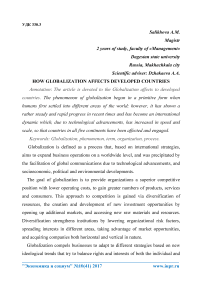How globalization affects developed countries
Автор: Salikhova A.M.
Журнал: Экономика и социум @ekonomika-socium
Статья в выпуске: 10 (41), 2017 года.
Бесплатный доступ
The article is devoted to the Globalization affects to developed countries. The phenomenon of globalization began in a primitive form when humans first settled into different areas of the world; however, it has shown a rather steady and rapid progress in recent times and has become an international dynamic which, due to technological advancements, has increased in speed and scale, so that countries in all five continents have been affected and engaged.
Globalization, phenomenon, term, organization, process
Короткий адрес: https://sciup.org/140234796
IDR: 140234796
Текст научной статьи How globalization affects developed countries
Globalization is defined as a process that, based on international strategies, aims to expand business operations on a worldwide level, and was precipitated by the facilitation of global communications due to technological advancements, and socioeconomic, political and environmental developments.
The goal of globalization is to provide organizations a superior competitive position with lower operating costs, to gain greater numbers of products, services and consumers. This approach to competition is gained via diversification of resources, the creation and development of new investment opportunities by opening up additional markets, and accessing new raw materials and resources. Diversification strengthens institutions by lowering organizational risk factors, spreading interests in different areas, taking advantage of market opportunities, and acquiring companies both horizontal and vertical in nature.
Globalization compels businesses to adapt to different strategies based on new ideological trends that try to balance rights and interests of both the individual and the community as a whole. This change enables businesses to compete worldwide and also signifies a dramatic change for business leaders, labor and management by legitimately accepting the participation of workers and government in developing and implementing company policies and strategies. Risk reduction via diversification can be accomplished through company involvement with international financial institutions and partnering with both local and multinational businesses.
Globalization brings reorganization at the international, national and sub-national levels. Specifically, it brings the reorganization of production, international trade and the integration of financial markets. The transformation of production systems affects the class structure, the labor process, the application of technology and the structure and organization of capital. Globalization is now seen as marginalizing the less educated and low-skilled workers. Business expansion will no longer automatically imply increased employment. Additionally, it can cause high remuneration of capital, due to its higher mobility compared to labor.
The phenomenon seems to be driven by three major forces: globalization of all product and financial markets, technology and deregulation. Globalization of product and financial markets refers to an increased economic integration in specialization and economies of scale, which will result in greater trade in financial services through both capital flows and cross-border entry activity. The technology factor, specifically telecommunication and information availability, has facilitated remote delivery and provided new access and distribution channels, while revamping industrial structures for financial services by allowing entry of non-bank entities, such as telecoms and utilities.
Some economists have a positive outlook regarding the net effects of globalization on economic growth. These effects have been analyzed over the years by several studies attempting to measure the impact of globalization on various nations’ economies using variables such as trade, capital flows and their openness, GDP per capita, foreign direct investment (FDI) and more. These studies examined the effects of several components of globalization on growth using time series cross sectional data on trade, FDI and portfolio investment. Although they provide an analysis of individual components of globalization on economic growth, some of the results are inconclusive or even contradictory. However, overall, the findings of those studies seem to be supportive of the economists’ positive position, instead of the one held by the public and noneconomist view.
The World Bank reports that integration with global capital markets can lead to disastrous effects, without sound domestic financial systems in place. Furthermore, globalized countries have lower increases in government outlays and taxes, and lower levels of corruption in their governments.
One of the potential benefits of globalization is to provide opportunities for reducing macroeconomic volatility on output and consumption via diversification of risk.
Non-economists and the wide public expect the costs associated with globalization to outweigh the benefits, especially in the short-run. Less wealthy countries from those among the industrialized nations may not have the same highly-accentuated beneficial effect from globalization as more wealthy countries, measured by GDP per capita etc. Although free trade increases opportunities for international trade, it also increases the risk of failure for smaller companies that cannot compete globally. Additionally, free trade may drive up production and labor costs, including higher wages for more skilled workforce.
Domestic industries in some countries may be endangered due to comparative or absolute advantage of other countries in specific industries. Another possible danger and harmful effect is the overuse and abuse of natural resources to meet new higher demands in the production of goods.
One of the major potential benefits of globalization is to provide opportunities for reducing macroeconomic volatility on output and consumption via diversification of risk. The overall evidence of the globalization effect on macroeconomic volatility of output indicates that although direct effects are ambiguous in theoretical models, financial integration helps in a nation’s production base diversification, and leads to an increase in specialization of production. However, the specialization of production, based on the concept of comparative advantage, can also lead to higher volatility in specific industries within an economy and society of a nation. As time passes, successful companies, independent of size, will be the ones that are part of the global economy.
The list of sources:
. Dolgov S.I. Globalization of economy: a new word or a new fact? - Moscow.: «Economics», 2014, 170p.
"Экономика и социум" №10(41) 2017
Список литературы How globalization affects developed countries
- Dolgov S.I. Globalization of economy: a new word or a new fact? -Moscow.: «Economics», 2014, 170p.


